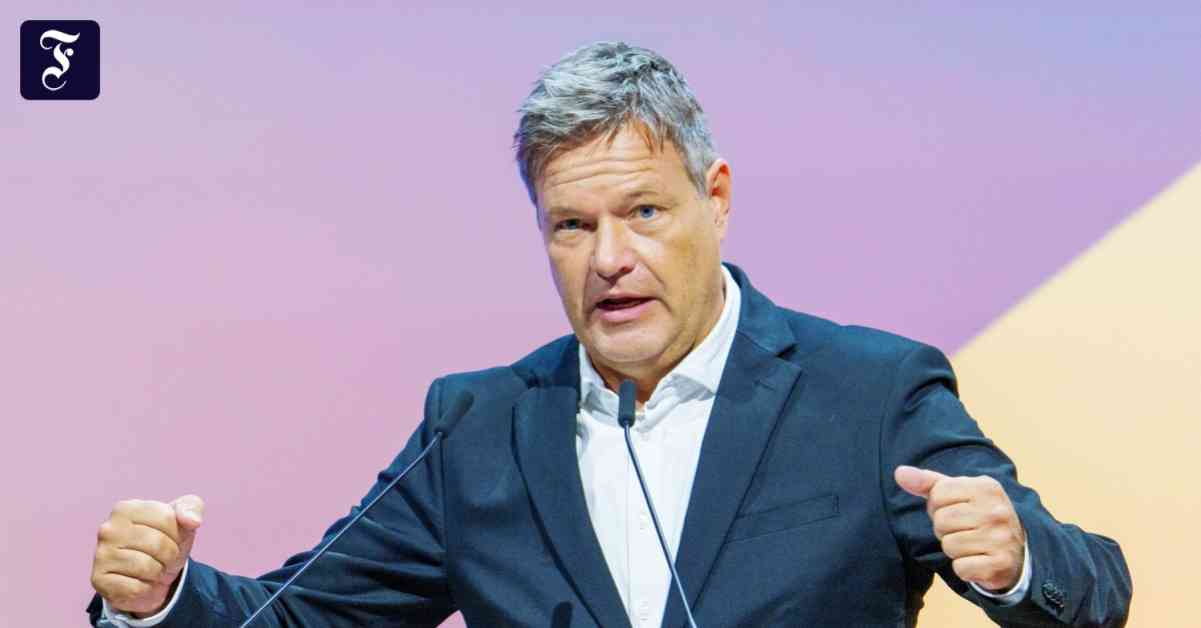Es ist a bit of activism, what is happening in the Berlin government district in light of the current poor economic situation. One day after the unpleasant growth forecast of the International Monetary Fund and just under a week before the industrial summit at the Chancellery, Minister of Economic Affairs Robert Habeck (Greens) published his proposals for an „update for the economy – impetus for a modernization agenda“ on Wednesday. The 14-page paper was released shortly before Habeck’s departure to the Indian capital New Delhi, where both the Asia-Pacific Conference of the German economy and German-Indian government consultations will take place until Saturday.
Central to Habeck’s proposals is a „Germany fund“ to promote investments. „We should promote investments with an uncomplicated investment premium of ten percent – and this for all companies, especially craft businesses as well as small and medium-sized enterprises,“ writes the Green politician. For an investment of 100,000 euros, the state should pay a premium of 10,000 euros, which the companies could write off as usual over the years. Habeck rejects a general reduction in corporate tax rates. Justification: These do not stimulate enough investments.
The investment premium should be limited to five years. The already variously promoted building sector should be excluded. The premium should be offset against the company’s tax liability in the year of investment. If a company does not make a profit, it should receive it as a credit.
How many billions the state would have to contribute to the premium, Habeck leaves open in the paper and his spokesman also declined to comment. It is only clear that it should not be financed from the current budget. „The greater economic growth would ensure that the national debt would only rise moderately in relation to economic performance,“ writes the Minister of Economic Affairs.
Habeck had repeatedly called for a relaxation of the debt brake in the past, but had failed with the FDP and CDU leader Friedrich Merz. With a touch of defiance, he writes in the paper: „BDI, ECB, OECD, Bundesbank, and the overwhelming majority of economists advocate for a contemporary adjustment of fiscal rules.“
State investments for transport, education, and digital
On the other hand, the second pillar of the Germany fund, the expansion of state investments, receives a price tag. Referring to figures from, among others, the BDI industrial association, Habeck sets 100 billion euros for transport, 70 billion euros for education and research, and 60 billion euros for digitization, totaling 230 billion euros. The expansion of the power grid should also be financed „perspectively“ through the Germany fund. Like the Chancellor, Habeck also wants to reduce network fees to relieve companies.
The SPD is also campaigning for more debt-financed investments under the slogan Germany fund. The issue is likely to play a major role in the election campaign. Olaf Scholz announced in his government statement last week, to the surprise of his cabinet members, a meeting in the Chancellery with industry and trade unions on October 29 for a „pact“ to secure jobs. The background is the job cut plans in numerous companies, such as the automaker Volkswagen and the supplier ZF.
Too dependent on industry?
The statement in the foreword „We are too one-sidedly dependent on the success of traditional industrial sectors“ is likely to be understood as a reply to the Chancellor’s industrial summit. Numerous medium-sized business associations had complained that the government was too focused on industrial giants like VW, Thyssenkrupp, and BASF.
Unlike the investment premium, Habeck’s paper remains vague in many other points. For example, it says, „a drastic reduction of data protection bureaucracy is necessary.“ With regard to the much-criticized supply chain law in the economy, he advocates for a „whitelisting of countries with legally equivalent standards.“ Generally, there is a need for „less reporting obligations, more self-responsibility in compliance with rules, and then clear and consistently enforced sanctions.“ He wants to achieve that women work more by better tax deductibility of childcare costs.
Climate goals remain in focus
On the subject of climate protection, Habeck reminds that „Europe and Germany have decided here with the approval of all democratic forces for ambitious goals.“ In the opposition, but also in the economy, considerations had recently become louder as to whether Germany, like other industrialized countries, should give itself more time to achieve climate neutrality. Habeck urged that the economy needs reliability. „So we should not constantly question the phase-out of the fossil combustion engine.“
At one point, however, he also admits to excessive ambition: „For green hydrogen, for example, such strict criteria have been agreed that the ramp-up is blocked by them. This is not right, and I am advocating for a change.“ He wants to stick to targeted subsidies for individual companies: „Instruments like climate protection agreements are essential.“












